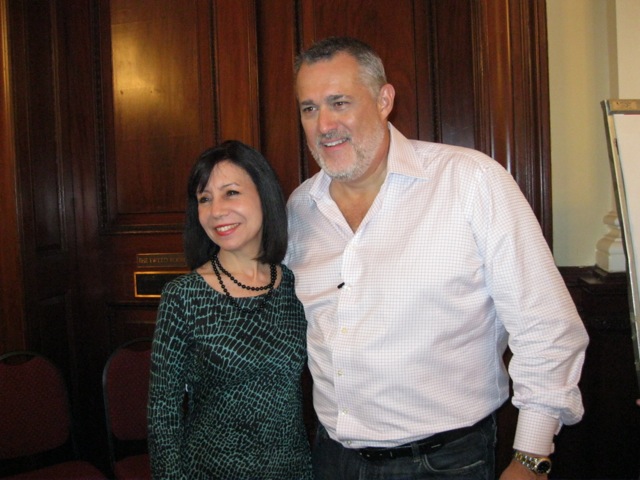The big day has finally arrived. You've rehearsed your presentation for months, and now it's time to step onto the stage. The spotlight hits, and suddenly, you realize—where is the audience? Anyone who’s been on a large stage knows that when all the lights are on you, the audience fades into darkness. You can’t see them, even though you know they’re right there in front of you.
Or maybe your presentation is happening online—you're leading a webinar, and the audience is nowhere to be found. All you can see is your slide deck. How do you create a connection? Where do you focus? How can you tell if the audience is engaged?
These are common concerns I often hear from clients. The good news is, whether you're on stage or online, there are effective ways to connect with your audience, even when you can’t see them.
In-Person: The Darkened Stage Dilemma
When you’re on stage, even if you can’t see your audience, you can hear them. Listen for laughter, the rustling of seats, or even a cough—these small cues remind you they’re there. Professional actors master this technique, and so can you. The key is to act as if the audience is fully visible.
Start by using strong stage presence and eye contact. Even if you can't lock eyes with individuals, break the room into quadrants and focus on delivering your message to different sections. This approach helps maintain the illusion of connection.
Movement on stage is also crucial. If you stay rooted behind a podium, staring into the dark, you’ll quickly feel like you’re speaking into a void. Instead, move intentionally to different parts of the stage to emphasize key points. This not only keeps you energized but also keeps the audience engaged—they'll naturally follow your movements.
One of the most powerful tools you have is interaction. Ask your audience to repeat a word or mantra. Encourage them to clap if they agree with a point. Add humor, and pause for laughter. Hearing any kind of response will reassure you that they’re with you, even when you can’t see them.
Virtual Presentations: The Screen Barrier
Virtual presentations pose an even greater challenge: the total absence of any visible audience. As one LinkedIn connection said, “My biggest challenge is not being able to see the attendees’ reactions, since my slides take up the whole screen.” This is a common frustration, but with a shift in mindset, you can overcome it.
The first step is to reframe your thinking. Consider yourself a news anchor giving a satellite interview—your job is to speak directly to the camera as if you're talking to one person. Reporters appear natural on camera because they’ve learned to focus on this invisible audience.
One strategy is to place a picture of a few friendly faces near your laptop camera, or even imagine you're speaking to an avatar. If you prefer real people, invite a few friends to sit in the room with you while you present.
Elizabeth Browning, an actress, trainer, and coach, suggests “making friends with the computer.” This means you need to treat your device like a person—talk to it, direct your energy into the camera, and visualize that energy extending across the virtual space to your audience. When you set this intention, your audience will feel your presence, even through a screen.
Final Thoughts: Connection Without Sight
Whether you're in a darkened auditorium or behind a screen in a virtual meeting, you don’t need to see your audience to make an impact. By mastering stage techniques and shifting your mindset for online presentations, you can create a meaningful connection with any audience—even when they seem invisible.
To learn how to Speak Confidently and Effectively check out my LinkedIn learning course. It ranked in the Top 20 Most Popular courses for 2 years.
To learn techniques to overcome fear of speaking, read Chapter 3 of Knockout Presentations.
To work with me contact DiResta Communications, Inc.




 In a Republican debate, Senator Marco Rubio had emerged as a great orator and touted his third place standing as a win. There was a lot of buzz about Rubio and he was riding high despite being number three. So it was no surprise that he walked into the next debate
In a Republican debate, Senator Marco Rubio had emerged as a great orator and touted his third place standing as a win. There was a lot of buzz about Rubio and he was riding high despite being number three. So it was no surprise that he walked into the next debate 
 Did you ever wonder if there was an Aladdin's Lamp for
Did you ever wonder if there was an Aladdin's Lamp for ![By Wikimania2009 Beatrice Murch (originally posted to Flickr as Audience) [CC BY 2.0 or CC BY 3.0], via Wikimedia Commons](http://static1.squarespace.com/static/584471bcd2b857fe8823846d/584aee108eaa8960076ec201/584aee288eaa8960076ec54a/1481305640928/Audience_-_Stallmans_pre-Wikimania_2009_talk_-_Wikimania_2009.jpg?format=original) Does your
Does your 
 Do you freeze up when you have to speak to senior management? Do you wonder how you can gain their attention and establish your credibility? Well, here's advice direct from the C-Suite.
Jeff Hayzlett, author of
Do you freeze up when you have to speak to senior management? Do you wonder how you can gain their attention and establish your credibility? Well, here's advice direct from the C-Suite.
Jeff Hayzlett, author of